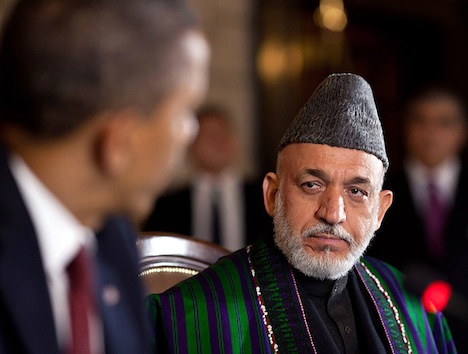4. Afghanistan presidential election, April 5.![]()
Afghanistan’s president since December 2001, Hamid Karzai (pictured above), is stepping down under the term limits of his country’s new constitution, initiating a new era in the country that will see a vast drawdown of US military forces in 2014 as well.
The most important question isn’t necessarily who follows Karzai but what follows him. Afghanistan remains less of a nation-state than a patchwork of various groups tied together by tribal and ethnic lines — the experience of Afghanistan as a national identity has more to do with resisting British, Soviet and now US occupation than any other uniting forces. What seems certain is that at the national level, Pashtun elites will continue to dominate the national government, with relatively autonomous control throughout the rest of the country, and the Taliban certain to retain significant influence in parts of southern Afghanistan and elsewhere. That means it’s important that the Pashtun, Tajik, Uzbek and other ethnic groups accept the election result.
With that caveat, the leading two candidates seem to be Abdullah Abdullah and Ashraf Ghani Ahmadzai. Abdullah lost the 2009 presidential race to Karzai in a relatively fraud-ridden vote, but it gives him perhaps a leg up in the 2014 contest. Karzai’s foreign minister between 2001 and 2005, Abdullah is half-Pashtun and half-Tajik, which could boost him among the two largest ethnic groups in Afghanistan. Pashtuns, concentrated in the broad center of the county, account for about 40% to 50% of Afghanistan’s population and Tajiks, concentrated in the far northeastern corner, account for between 25% and 30%. Abdullah has already built an impressively broad coalition that, controversially, includes hardline Islamists as well as moderates. Ghani, finance minister between 2002 and 2004, a former World Bank official and chancellor of Kabul University, was a minor candidate in the 2009 election. This time around, he’s running a stronger campaign with the support of general Abdul Rashid Dostum, perhaps the most important Uzbek political leader.
Karzai’s brother Qayum, a businessman with somewhat murky ethics, is also running and will likely attract significant support. But Zalmai Rassoul, who served as national security advisor from 2002 to 2010 and foreign minister from 2010 through October 2013 may be the candidate who most embodies continuity with the current administration. Abdul Rasoul Sayyaf, a top leader of the anti-Soviet mujahideen in the 1980s, who is thought to have had ties to al-Qaeda, is also expected to run, though he’s more recently opposed the Taliban within Afghanistan.
